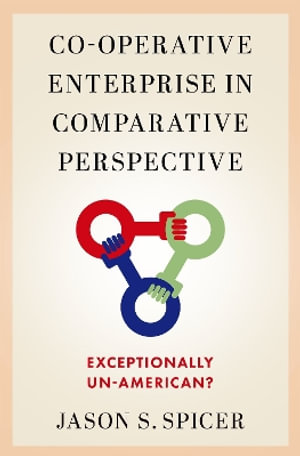
Co-operative Enterprise in Comparative Perspective Exceptionally Un-American?
Exceptionally Un-American?
By: Jason S. Spicer
Hardcover | 6 September 2024
At a Glance
Hardcover
$220.90
Aims to ship in 10 to 15 business days
When will this arrive by?
Enter delivery postcode to estimate
Despite extensive study of co-operatives' real and imagined benefits, we know little about the conditions under which they achieve the lasting scale needed to be a viable alternative and transform the economy. Under what conditions can co-operatives achieve such scale? And are such conditions present in the US, where, despite repeated organizing efforts, co-operatives remain exceptionally rare at scale?
A rigorous comparative-historical analysis of co-operative enterprises in different national contexts, this book seeks to answer these questions.Deploying two different variants of the new institutionalism, Spicer treats the US as a central case of comparative failure, as contrasted to three rich democracies where the co-operative business model has been more successful: Finland, France, and New Zealand.
Through an institutional approach, the cause of co-operatives' comparative weakness in the US is identified as reflecting the joint effect of economic liberalism and structural racism. Only in the US did the co-operative face, in its initial development, two well-entrenched incumbents operating with competing ownership models: the investor-owned firm and the race-based chattel slavery system of ownership of people. Proponents of these two models acted to deprive the co-operative movement of resources, and undermined the solidarity at the models' heart, splintering the American co-operative movement in the process. In subsequent waves of co-operative organizing, advocates have never fully succeeded in overcoming these initial obstacles, resulting in a different outcome in the United States, consistent with broader conceptions of the US as a perennial outlier (i.e., American exceptionalism). In contrast, in the successful cases, advocates were better able to leverage resources to animate a national solidarity and procure the necessary political and economic resources to achieve scale.
ISBN: 9780197665077
ISBN-10: 0197665071
Published: 6th September 2024
Format: Hardcover
Language: English
Number of Pages: 328
Audience: Professional and Scholarly
Publisher: Oxford University Press USA
Country of Publication: GB
Dimensions (cm): 16.6 x 24.3 x 2.9
Shipping
| Standard Shipping | Express Shipping | |
|---|---|---|
| Metro postcodes: | $9.99 | $14.95 |
| Regional postcodes: | $9.99 | $14.95 |
| Rural postcodes: | $9.99 | $14.95 |
How to return your order
At Booktopia, we offer hassle-free returns in accordance with our returns policy. If you wish to return an item, please get in touch with Booktopia Customer Care.
Additional postage charges may be applicable.
Defective items
If there is a problem with any of the items received for your order then the Booktopia Customer Care team is ready to assist you.
For more info please visit our Help Centre.
You Can Find This Book In
This product is categorised by
- Non-FictionSociety & CultureSocial GroupsUrban Communities
- Non-FictionEconomicsPolitical Economy
- Non-FictionBusiness & ManagementManagement & Management Techniques
- Non-FictionSociology & AnthropologySociologySociology & Work & Labour
- Non-FictionSociology & AnthropologySociologySocial Theory
- Non-FictionSociety & CultureSocial Issues & Processes
- Non-FictionReference, Information & Interdisciplinary SubjectsInterdisciplinary StudiesInstitutions & Learned Societies























